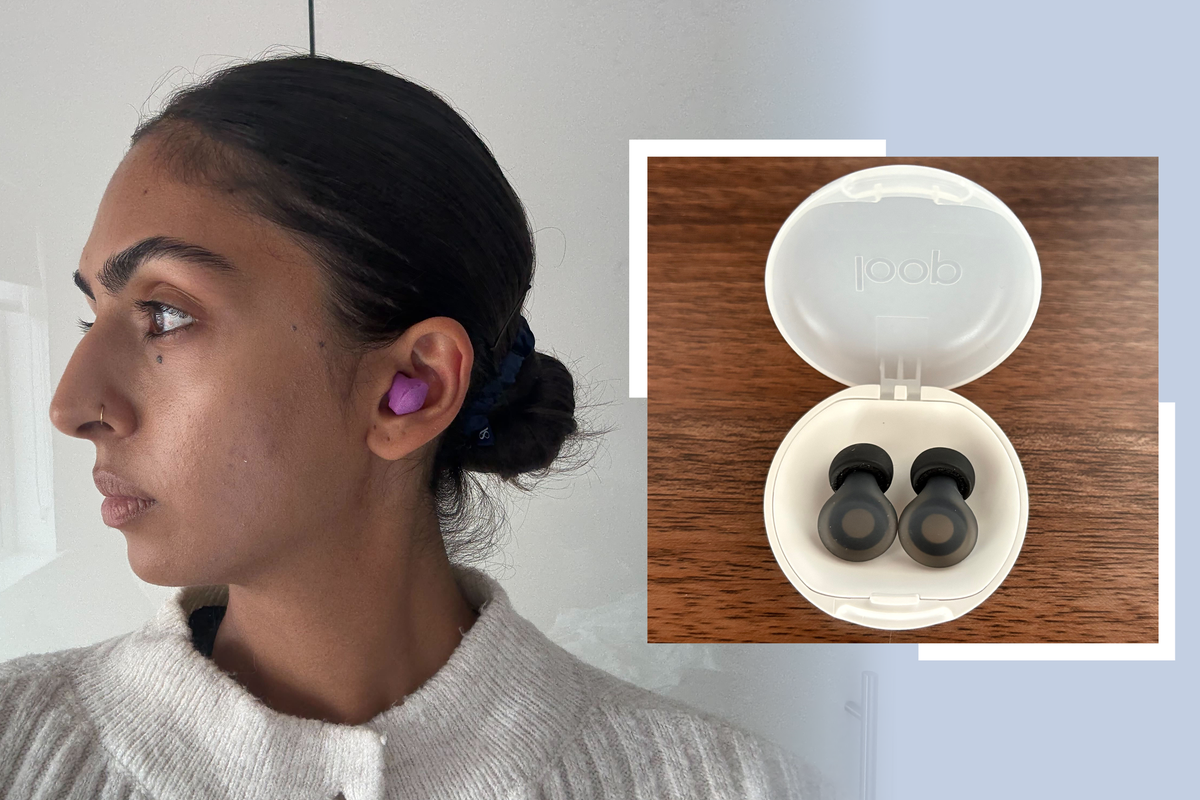
Whether it’s traffic outside your window or a snoring partner beside you, it can often be a struggle to get a good night’s sleep. A pair of the best earplugs for sleeping can help to reduce the sound of these distractions and improve the quality of your shut-eye.
These little buds come in several varieties: foam, silicone, wax and even sleep headphones. Choosing the right one can be tricky, according to Dr Siobhán Brennan, lead clinical scientist in audiology at Sheffield Teaching Hospitals. “To maximise quality of sleep, comfort will be important,” she said. “There may be an element of trial and error to find a material that is most comfortable for the wearer. The comfort will depend on both how it feels to sleep on and also how the material feels against your skin.”
It’s important to note that earplugs for sleeping aren’t designed to be noise-cancelling. Each comes with an SNR figure (single number rating), which is the average noise reduction they provide, in decibels. They will minimise noise to an extent, but you’ll still be able to hear crucial sounds such as alarms or your baby crying.
To benefit from the best noise reduction from your earplugs, it’s important to follow the instructions so they are inserted correctly. Dr Brennan says, “For most types, it can be easier to insert earplugs while gently pulling the outer ear (pinna) back a little, as this can slightly expand the entrance of the ear canal, and then inserting the earplug with the other hand. It takes practice, though, and using a mirror can help.” As for foam eaplugs, “it is usually necessary to squeeze them before putting them in, then after they are in, holding them in place for a few seconds while they expand”, she adds.
Taking expert advice into consideration, I spent weeks testing a selection of earplugs across different materials and price points.
How I tested
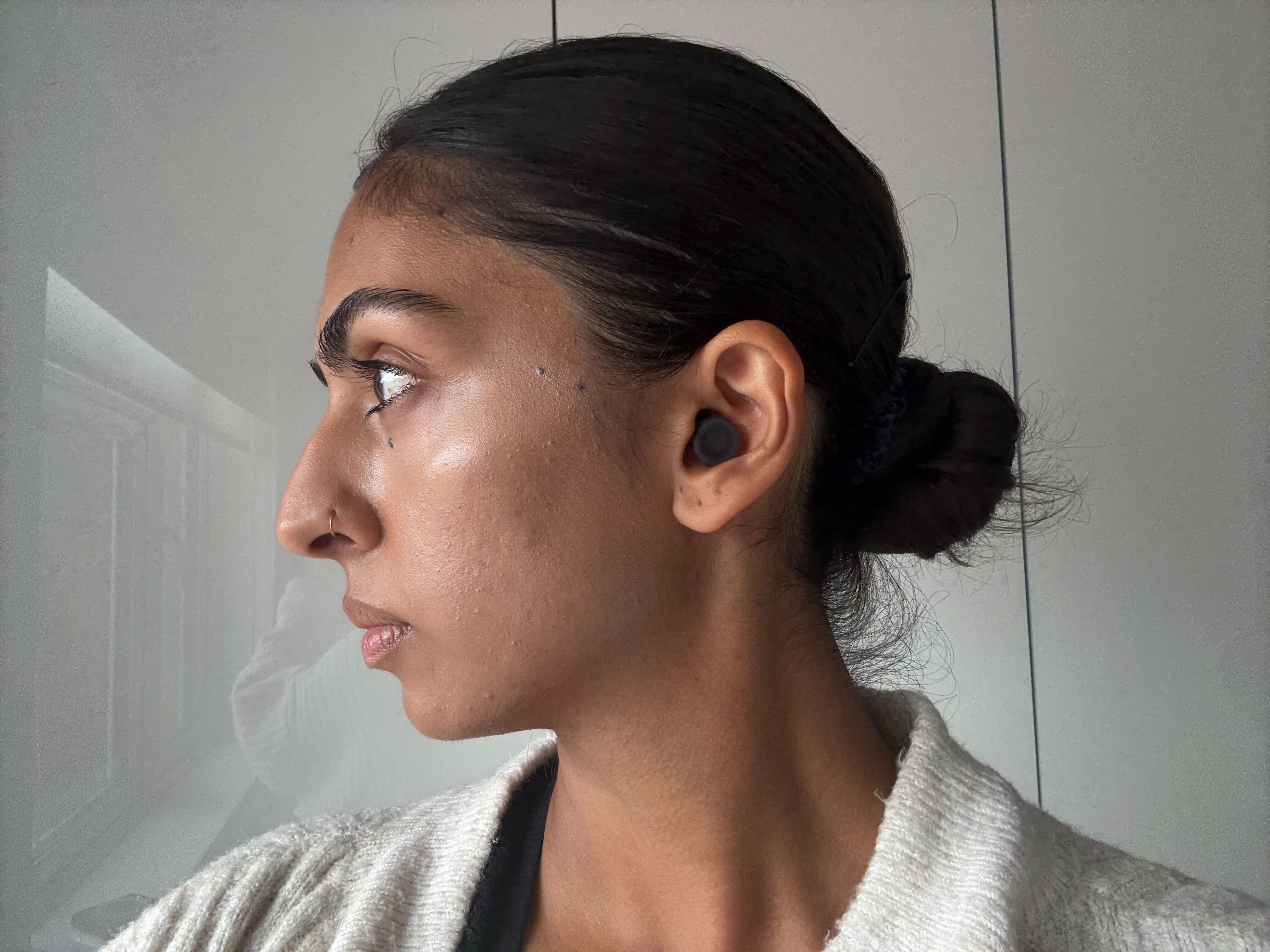
I tested each pair of earplugs over a week to see how they fared while I slept, taking note of the following factors:
- Noise reduction: I’ve stated the SNR for each pair of earplugs, but I also considered how much noise I was able to hear when wearing them, whether that was footsteps past my bedroom or cars outside my window. All the earplugs recommended below were the most effective at reducing noise, so this isn’t something you need to worry about. It’s the other factors below that are most important when choosing the right pair of earplugs.
- Ease of inserting: Following the instructions provided with each set of earplugs, I assessed how easy it was to get them into a comfortable and secure position. Some were effortless, while some required a fair bit of adjustment to get the right fit. Everyone has unique ear shapes, so I also considered whether each set of earplugs came with different-sized earbuds.
- Comfort: A pair of earplugs can be excellent at reducing noise, but if they feel uncomfortable to wear, then you aren’t going to reach for them. I paid close attention to how much pressure each pair of earplugs put on my ear canal, and as a side sleeper, I checked to see if I could feel them sticking out when lying down.
- Cleaning: I tested a wide range of reusable earplugs, which should be kept clean to avoid bacteria build-up. With this in mind, I also assessed how easy each pair was to clean according to the instructions given by the brands.
Why you can trust IndyBest reviews
Sabrina Sahota is The Independent’s consumer editor and she never recommends a product that isn’t worth your money. She has more than five years of experience testing products that promise a better night’s sleep. She’s become an expert in making her sleep space a haven of comfort, whether it’s testing the best mattress toppers, pillows, or, in this case, earplugs. Beyond this, she really values her sleep, and lives on a busy road, so she is constantly looking for solutions that will mean she isn’t disturbed.
The best earplugs for sleeping are:
- Best overall – Earth’s Secret mute earplugs: £34.99, Amazon.co.uk
- Best budget earplugs – Beary Quiet foam earplugs: £15, Amazon.co.uk
- Best for side sleepers – Loop dream earplugs: £44.95, Amazon.co.uk
- Best for size range – Mixx assistive audio sleep earplugs: £20, Robertdyas.co.uk
- Best foam earplugs – Earhub soft foam earplugs: £5, Amazon.co.uk
Earth’s Secret mute earplugs
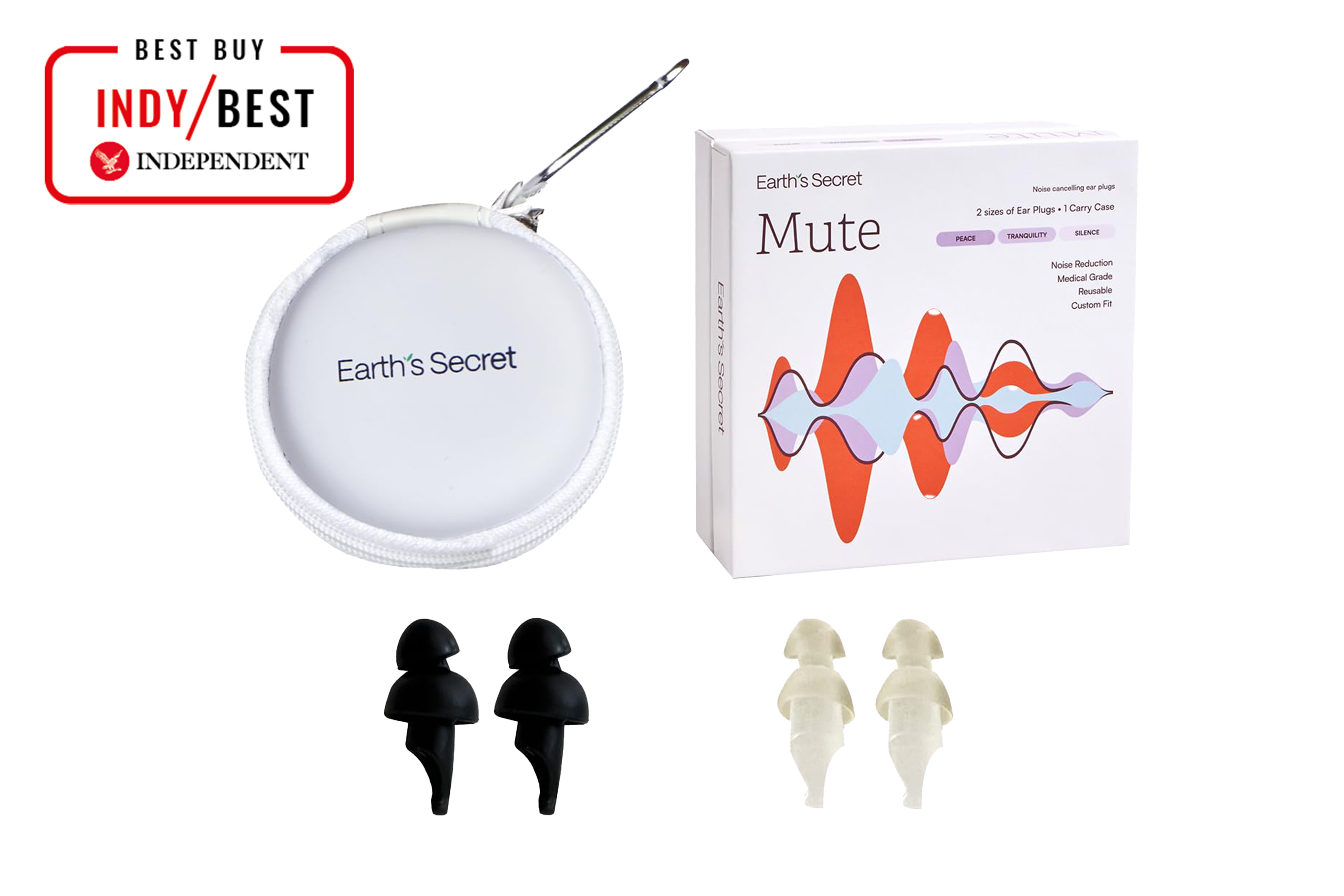
Best: Earplugs overall
Material: Thermoplastic elastomer (rubber)
SNR: 26dB
Reusable: Yes
Why we love it
- Comfortable to wear while side sleeping
- Two sizes included
- Easy to insert
- Storage case is handy for travel
Take note
- Rubber attracts dust
Out of all the earplugs I tested, the Earth’s Secret mute earplugs had the most comfortable and secure fit. The brand has clearly put a lot of thought into the design with nifty features. For example, they have an indentation on the stem of the earplugs where your finger can rest as you insert them – this made them quick and easy to put in, with no adjustment needed to get them into a comfy position for side sleeping. I also liked that there’s a small and medium-sized pair of earplugs included to help you get the right fit.
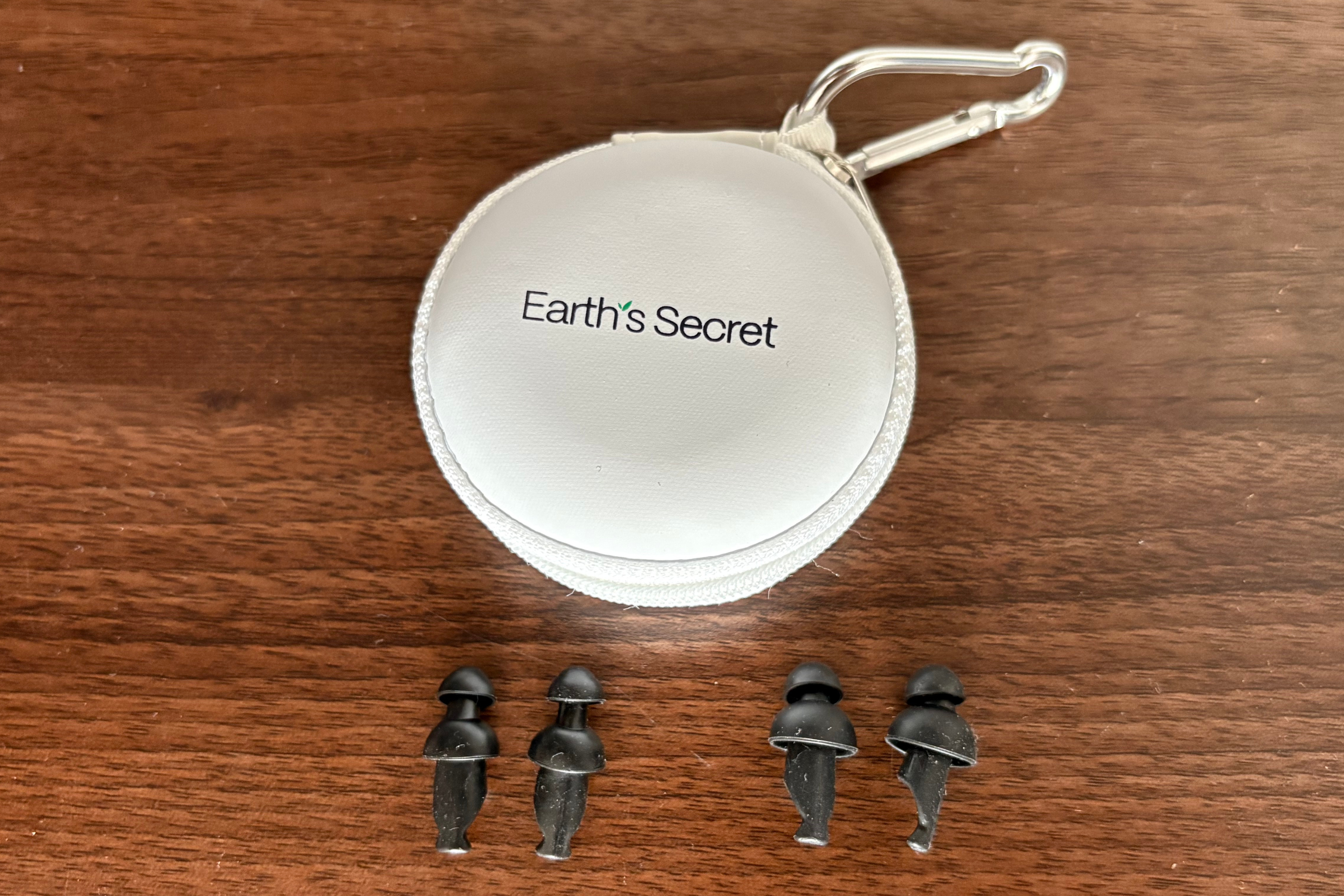
The large storage case, complete with a carabiner clip, is included, so you can clip it to or inside a bag if you’re travelling with earplugs. The rubber material of the earplugs also attracted dust, so I’d advise using the storage case to keep them clean between uses. But you’ll also want to keep them clean with mild soap and water, as advised by Earth’s Secret.
There’s no denying that they’re pricey, but if you struggle with traditional earplugs and are getting disturbed at night, they are well worth the extra spend. And, importantly, they did a great job at reducing distracting sounds of traffic outside my window and others in the home.
Buy now £34.99, Amazon.co.uk
Beary Quiet foam earplugs
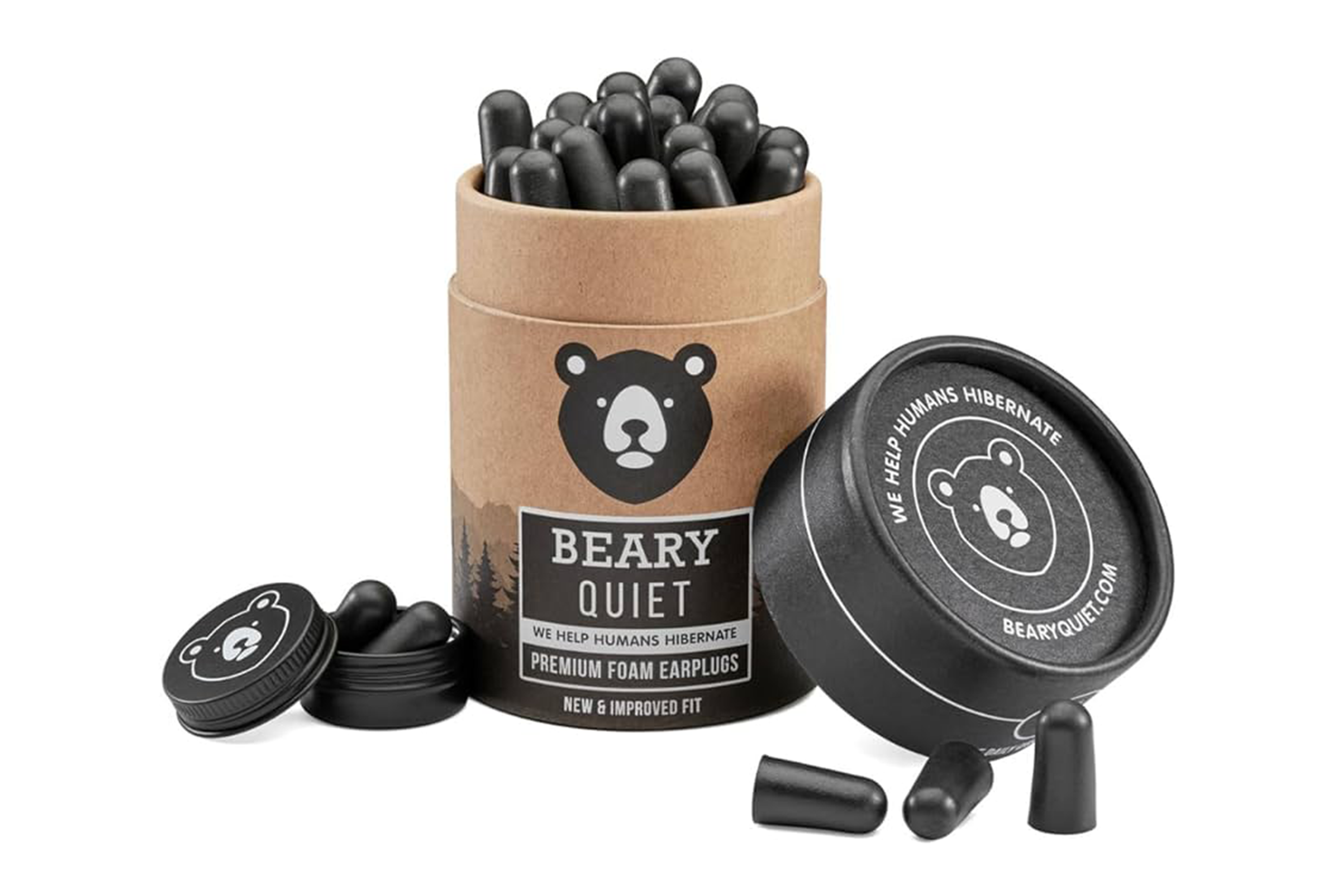
Best: Budget earplugs for sleeping
Material: Foam
SNR: 37dB
Reusable: Yes
Why we love it
- One pack will last you a while
- Foam expands quickly for a secure fit
Take note
- Only come in one size
Having tested a range of earplug materials, I’ve found that foam tends to be the best at reducing noise, and these foam earplugs by Beary Quiet were especially excellent at blocking out sound. Despite being available in one size (as is the case with most foam earplugs), the squishy foam is easy to insert, and it quickly expands for a comfortable fit.
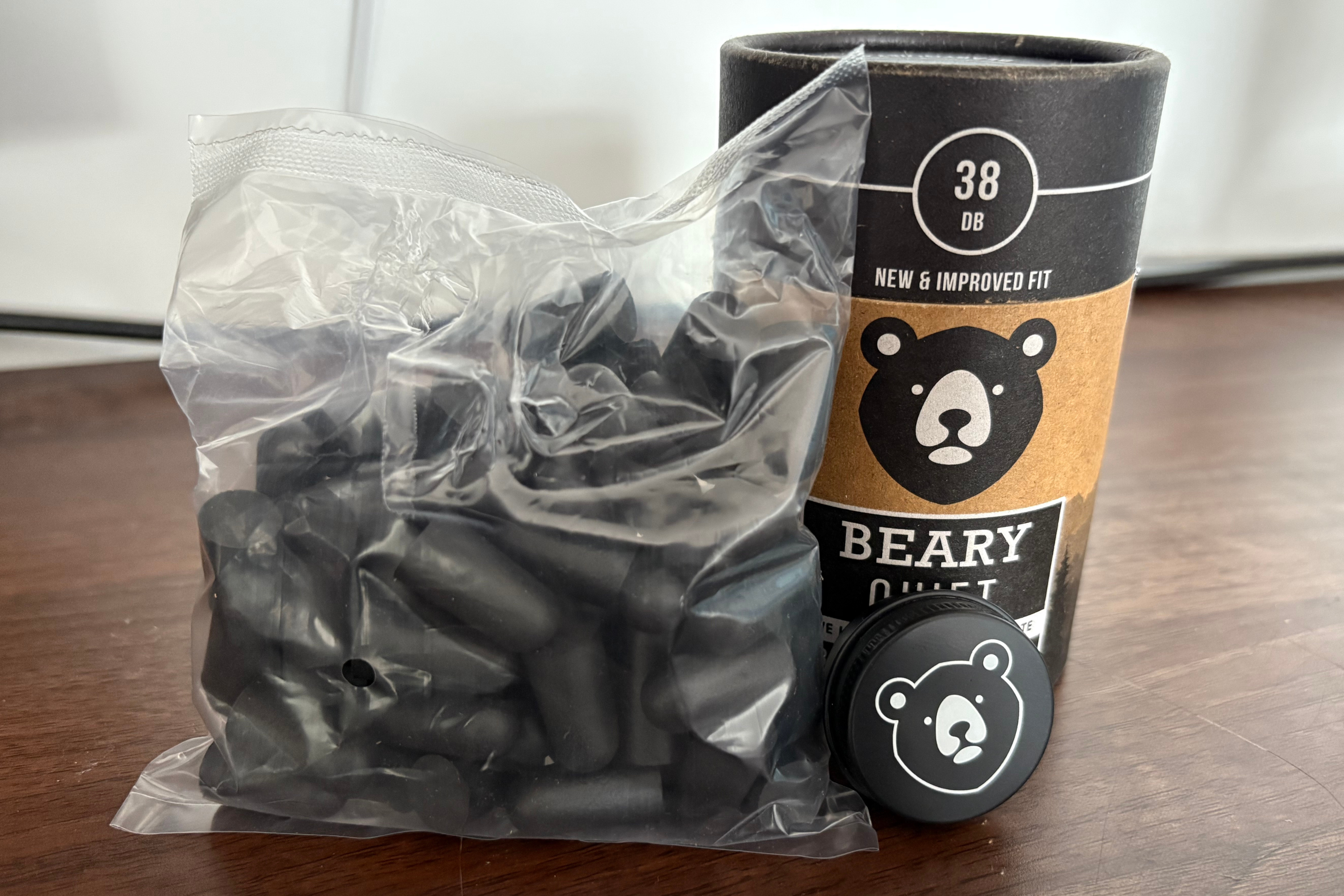
You get 30 pairs in the tub (working out at 50p per pair), so there are plenty to last you. Beary Quiet told me that the earplugs are reusable for up to seven days with daily use. Remember to wipe them with a dry cloth after each use and keep them in the storage container that’s included, so they don’t attract dust.
Buy now £14.99, Amazon.co.uk
Loop dream earplugs

Best: Earplugs for side sleepers
Material: Silicone and foam
SNR: 27dB
Reusable: Yes
Why we love it
- Comfortable to wear while side sleeping
- Customisable fit
- Easy to clean
Take note
- Pricey compared to other earplugs
As a side sleeper, I have struggled to find a pair of comfortable earplugs until I tried the Loop dream. Unlike traditional foam or silicone earplugs that tend to stick out when lying down, these have a flat silicone body attached to the tips, which neatly nestle into your earlobe. The result: I could barely feel them inside my ears or against my pillow when nodding off to sleep.
With a range of different-sized ear tips included (extra small, small, medium, large), I was able to find the perfect fit that felt secure, but not too tight. The oval ear tips have no crevices, making them easy to clean – simply remove the ear tips (this requires a bit of a tug) and wipe them down, as well as the earplug body, with a damp cloth.
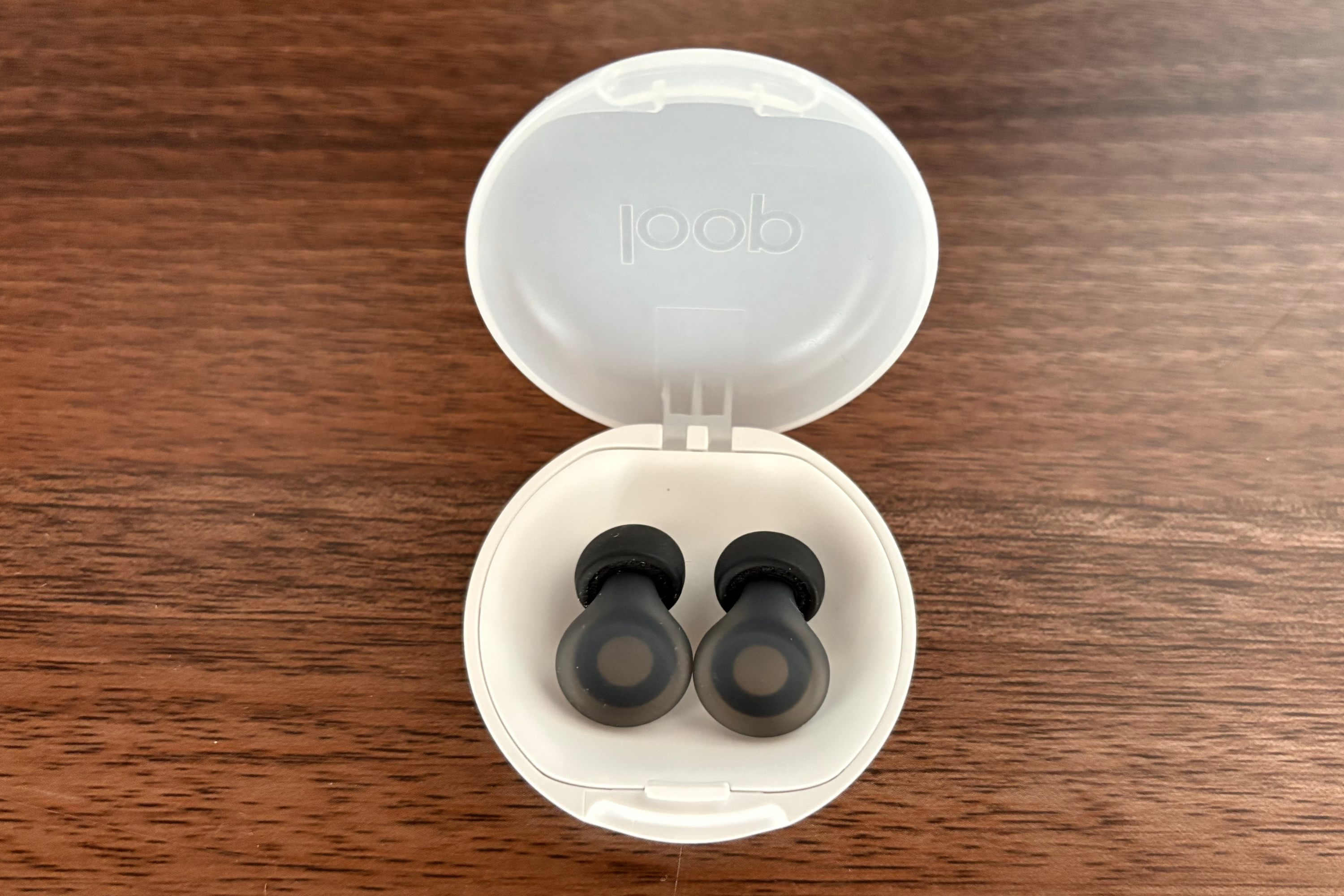
Noise reduction was good too – as with most earplugs for sleeping, they don’t block out all sound, but they were able to reduce the sound of cars outside.
Buy now £44.95, Amazon.co.uk
Mixx assistive audio sleep earplugs
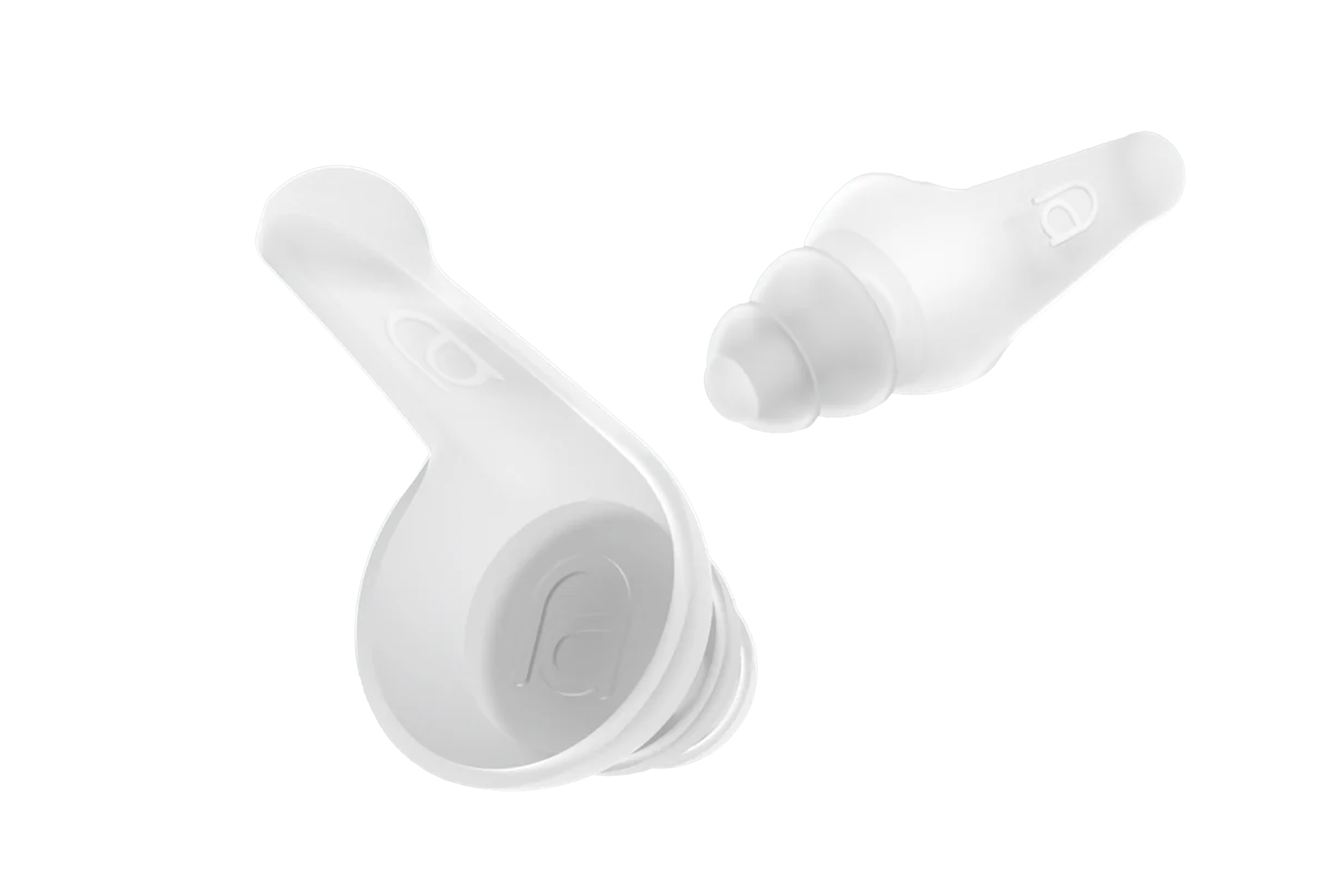
Best: Earplugs for size range
Material: Silicone
SNR: 17dB
Reusable: Yes
Why we love it
- Range of sizes included
- Soft
- Flexible silicone is easy to insert
Take note
- Average noise reduction is less than most
Made from medical-grade silicone, these earplugs are soft and flexible, making them easy to insert without causing any discomfort to the ear canal. You get three sizes included, which is more than most around this price point, so you should be able to achieve a secure fit.
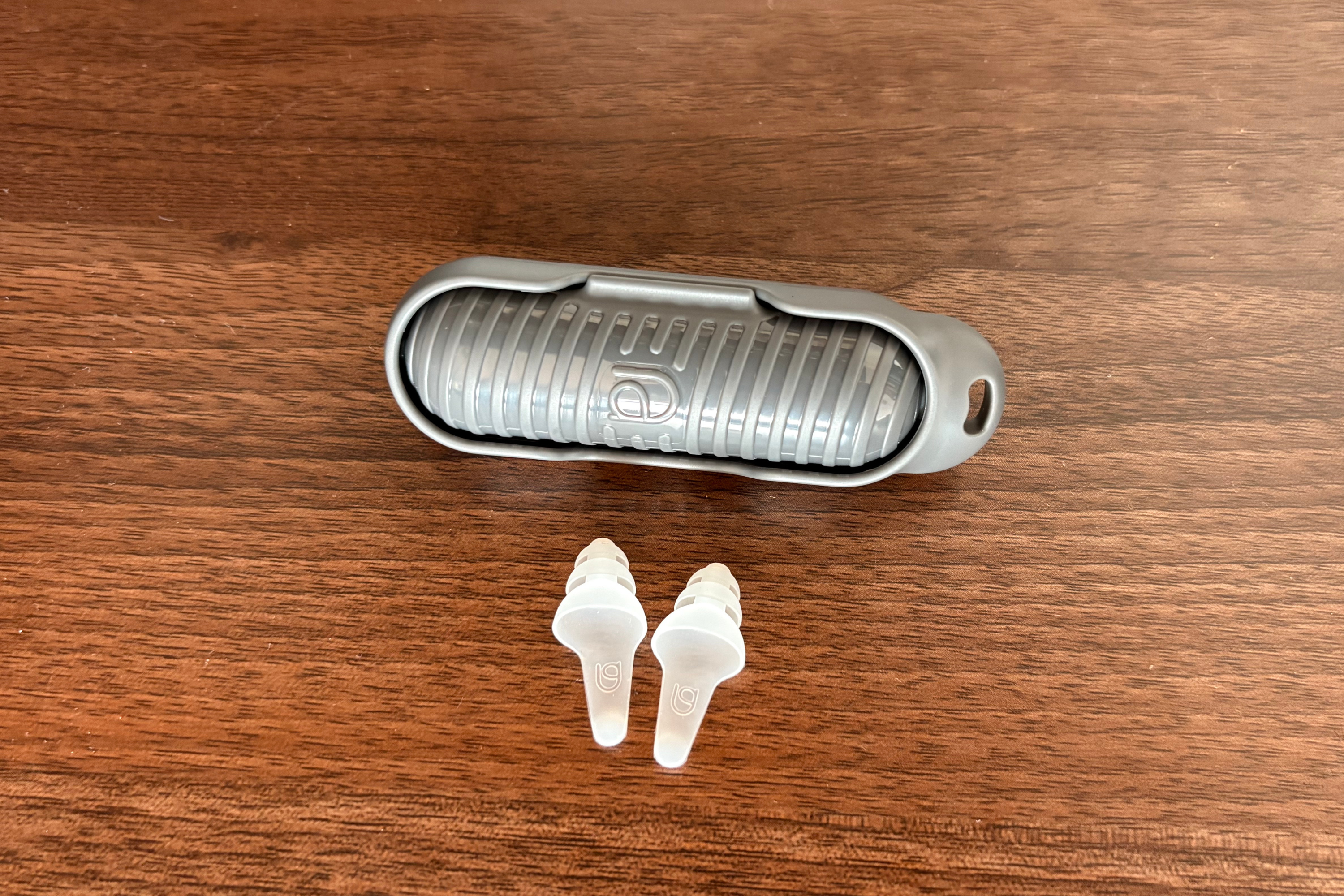
The earplugs have an average noise reduction of 17dB, which is less than most earplugs designed for sleeping. However, I didn’t find this to be an issue, and they successfully reduced distracting noises in and around my bedroom.
As the earplugs are reusable, Mixx advises you should clean them with hot water and leave them to air dry. There are a few crevices to get into, but the soft silicone is easy to move, so this is a quick task that you can do each morning.
Buy now £19.99, Robertdyas.co.uk
Earhub soft foam earplugs
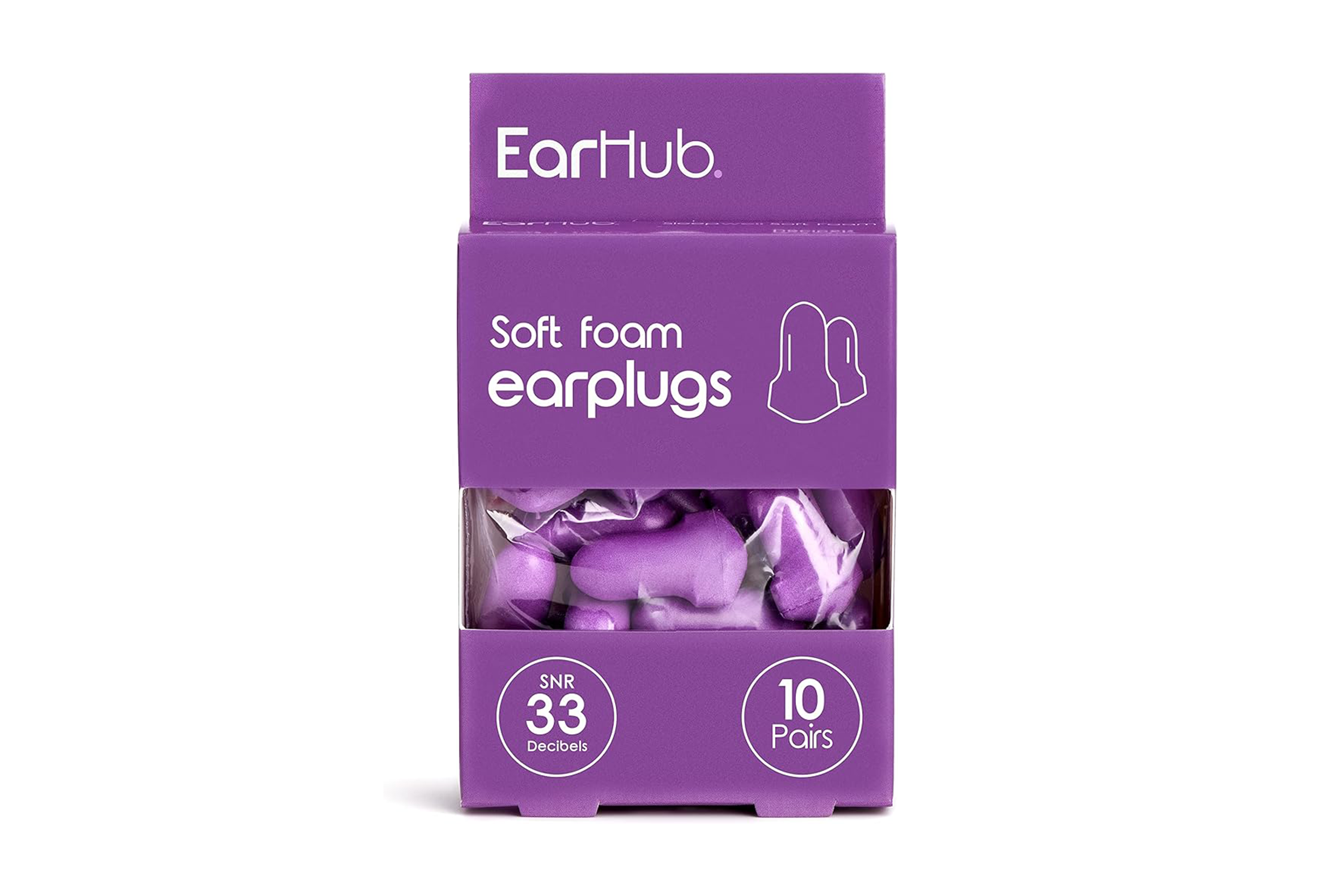
Best: Foam earplugs
Material: Foam
SNR: 33dB
Reusable: No
Why we love it
- T-shape is easy to insert
- Good value for money
Take note
- Take a while to expand in the ear canal
- Single-use
These foam earplugs are T-shaped, which Earhub claims makes them easier to insert. It’s a subtle design feature, but one that I found makes a difference when it comes to putting them in. The base of the earplug sits comfortably in the earlobe, so I found I could rest my head on the pillow without too much pressure.
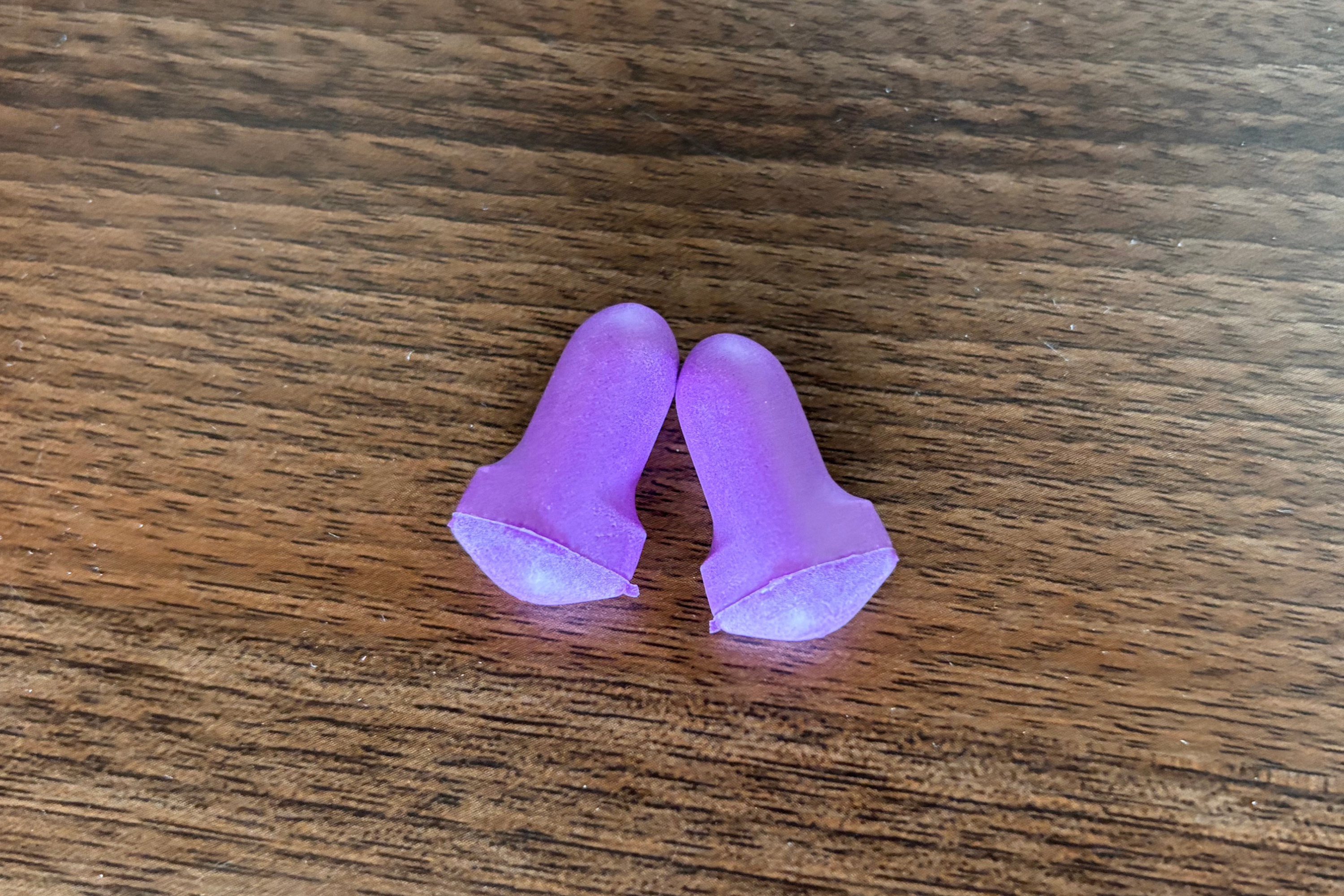
They take a little longer to expand in the ear canal than the Beary Quiet earplugs, so you may have to wait a minute or two for a secure fit. Nonetheless, these are small niggles – they do a good job at blocking out most sound, so if you’re looking for a cheap multi-pack of foam earplugs, these will do the trick.
Buy now £4.99, Amazon.co.uk
Soundcore A20 sleep earbuds

Best: Sleep headphones
Material: Silicone tips
SNR: No, active noise cancelling
Reusable: Yes
Why we love it
- Very comfortable to wear
- Range of sounds to choose from
- Easy to customise the fit
Take note
- Pricey compared to standard earplugs
While studies are inconclusive on whether white noise improves your sleep quality, some people find it helpful to listen to a low, inoffensive background noise. Soundcore’s sleep earbuds play a calming track of white noise to help you nod off. You can also choose from a library of other sounds such as light rain, a campfire, an aeroplane and even a washing machine.
I was dubious when I first heard white noise playing into my ears, but I was surprised at how quickly I was able to relax and get some shut-eye. The track plays until you’ve fallen asleep, after which the sealed tips work to reduce background noise. The sealed tips were effective, and I was pleasantly surprised to find the earbuds still in place in the morning.
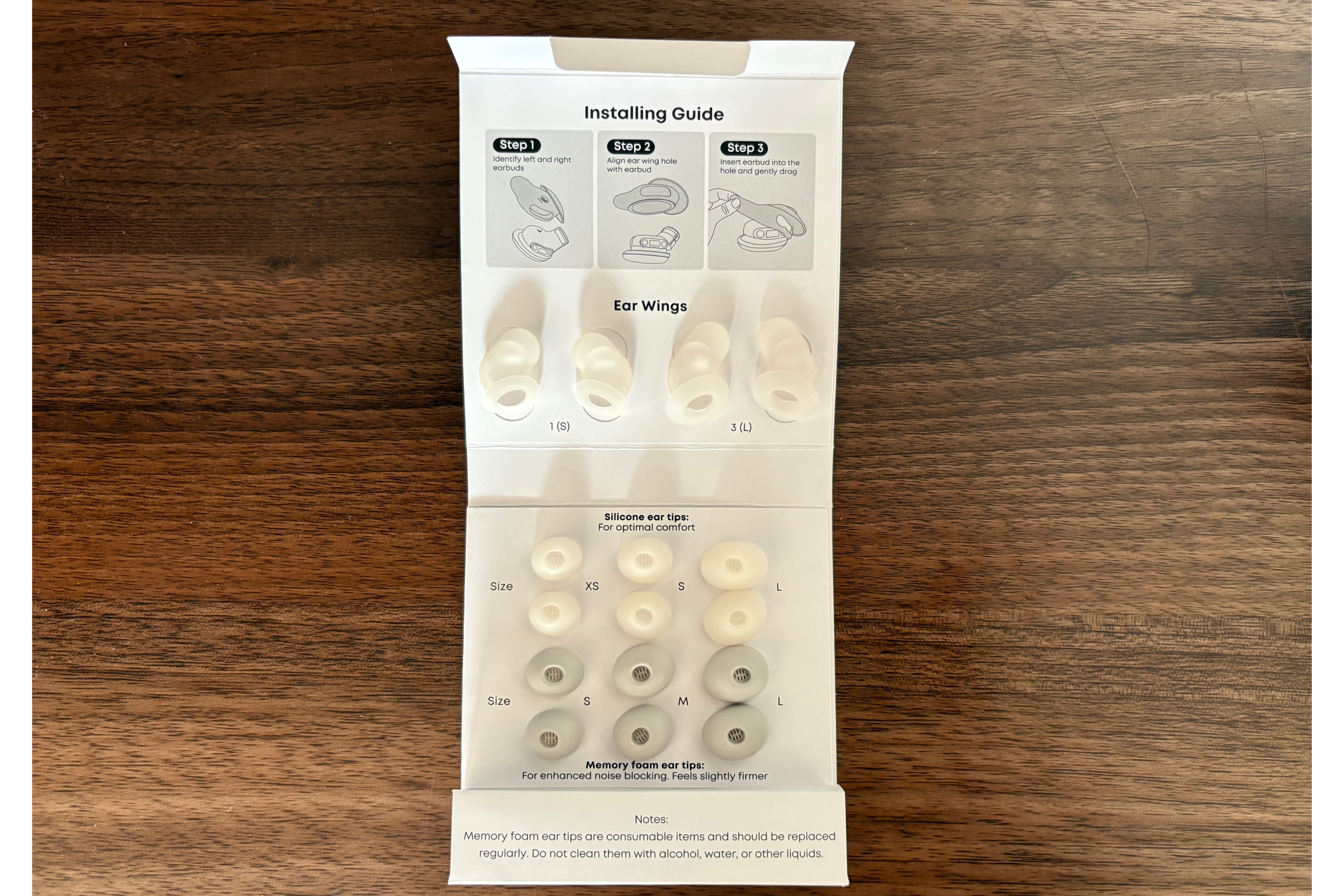
The earbuds require minimal setup, and I was able to use them straight out of the charging case. There’s a bit of adjusting to get the right fit, but this is easy to get the hang of once you’ve done it a few times. There are also three sizes of ear tips to choose from: extra small, small and large. You can opt for the breathable ear tips if you want more airflow and aren’t fussed about reducing noise once the track has stopped playing.
At £99.99, these are certainly an investment, but could be worth a go if standard earplugs aren’t working for you.
Buy now £97.98, Amazon.co.uk
Pluggerz sleep earplugs
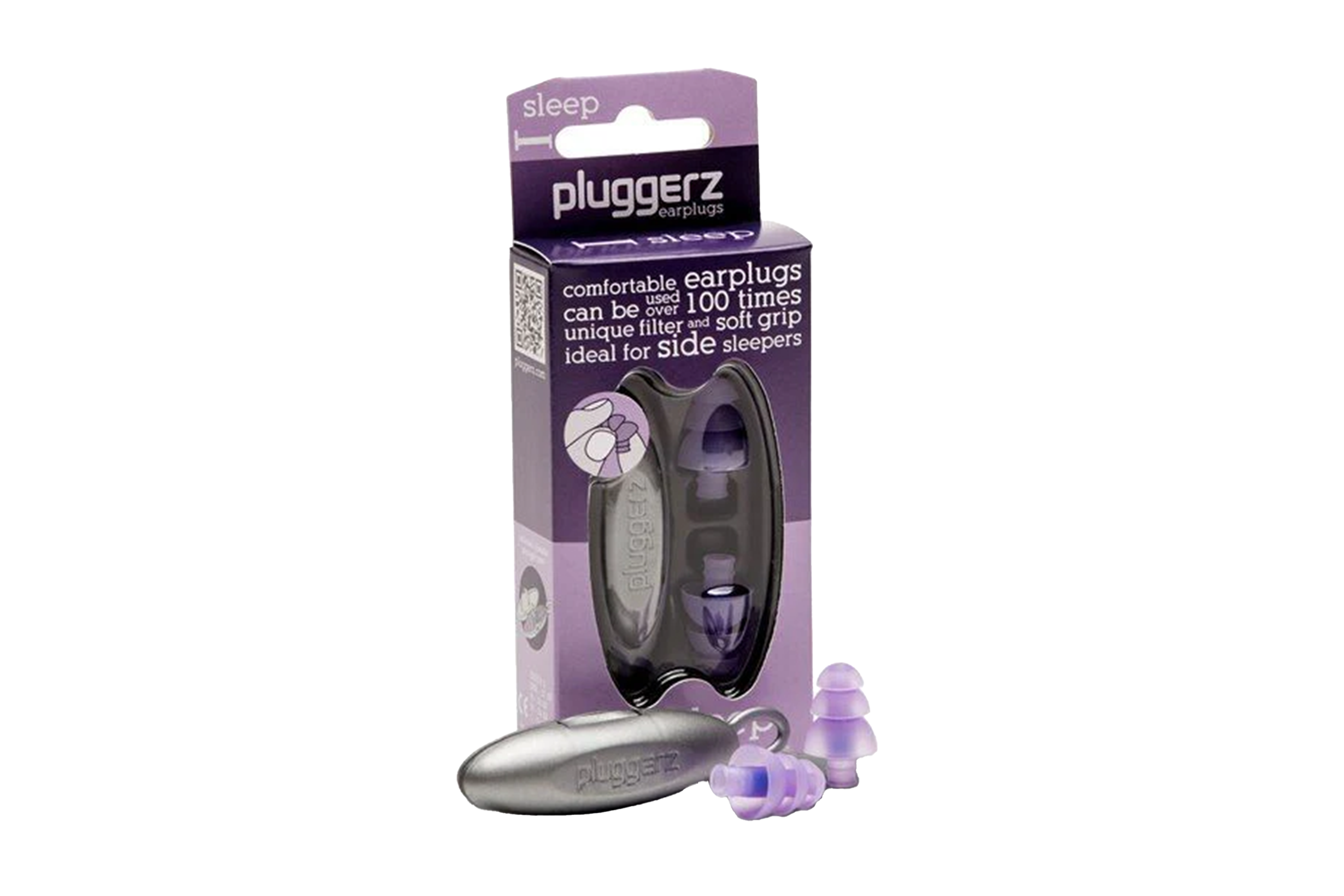
Best: Budget silicone earplugs
Material: Silicone
SNR: 27dB
Reusable: Yes
Why we love it
- Comfortable inside the ear canal
- Two sizes included
Take note
- Takes a bit of adjustment to get the right fit
Similar in design to the Mixx assistive audio sleep earplugs, these have a slightly shorter stem and are made from a more rigid silicone. In practice, this meant that they took a little more effort to insert, but once in place, they felt comfortable and didn’t irritate the ear canal.
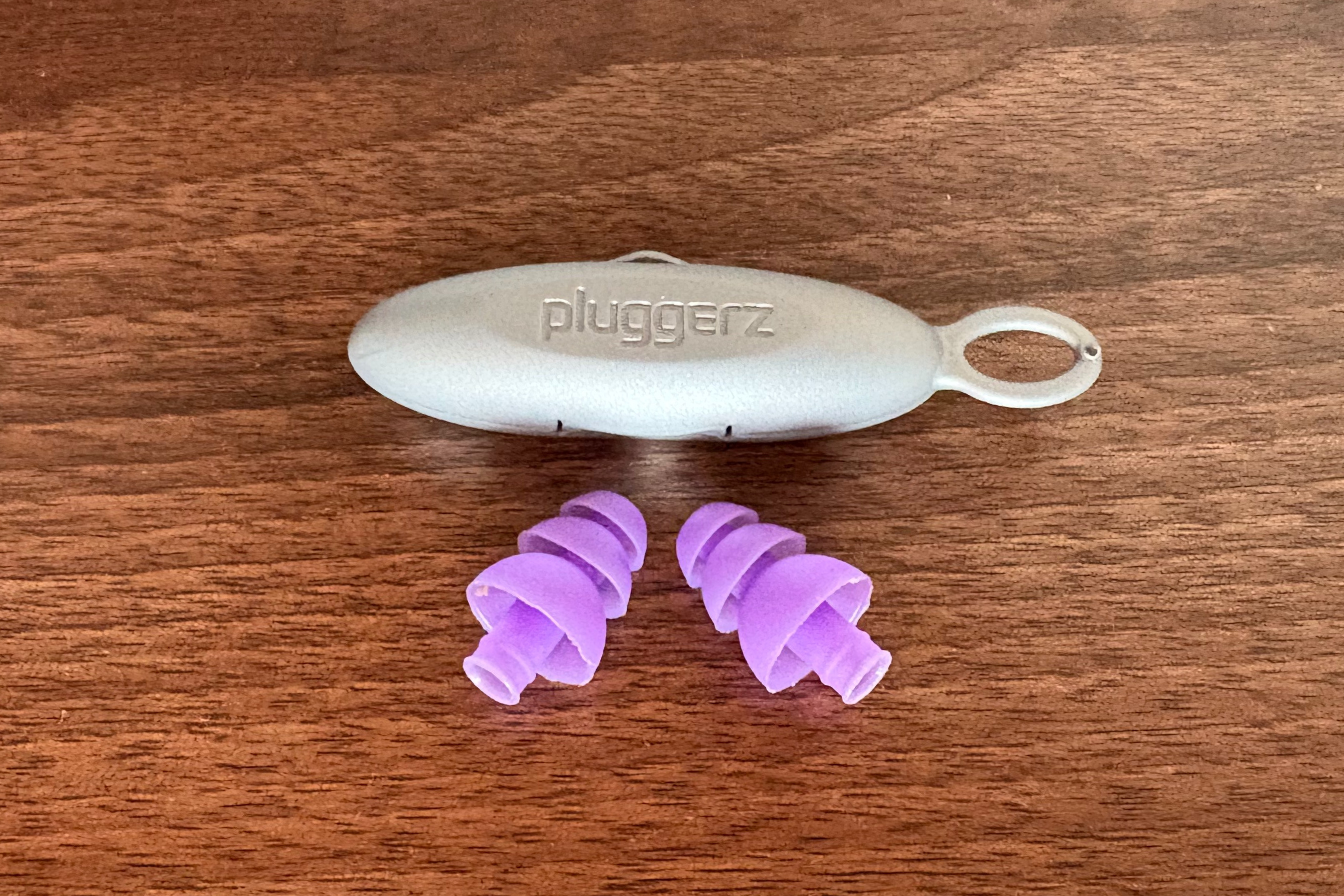
When it came to their core job, they were effective at blocking out most sound, such as footsteps outside my bedroom or traffic outside the window.
If you like the sound of the Mixx earplugs, but want to make a saving, these are a very similar option that does just as good a job at reducing noise while you sleep.
Buy now £12.99, Superdrug.com
BioEars soft silicone earplugs
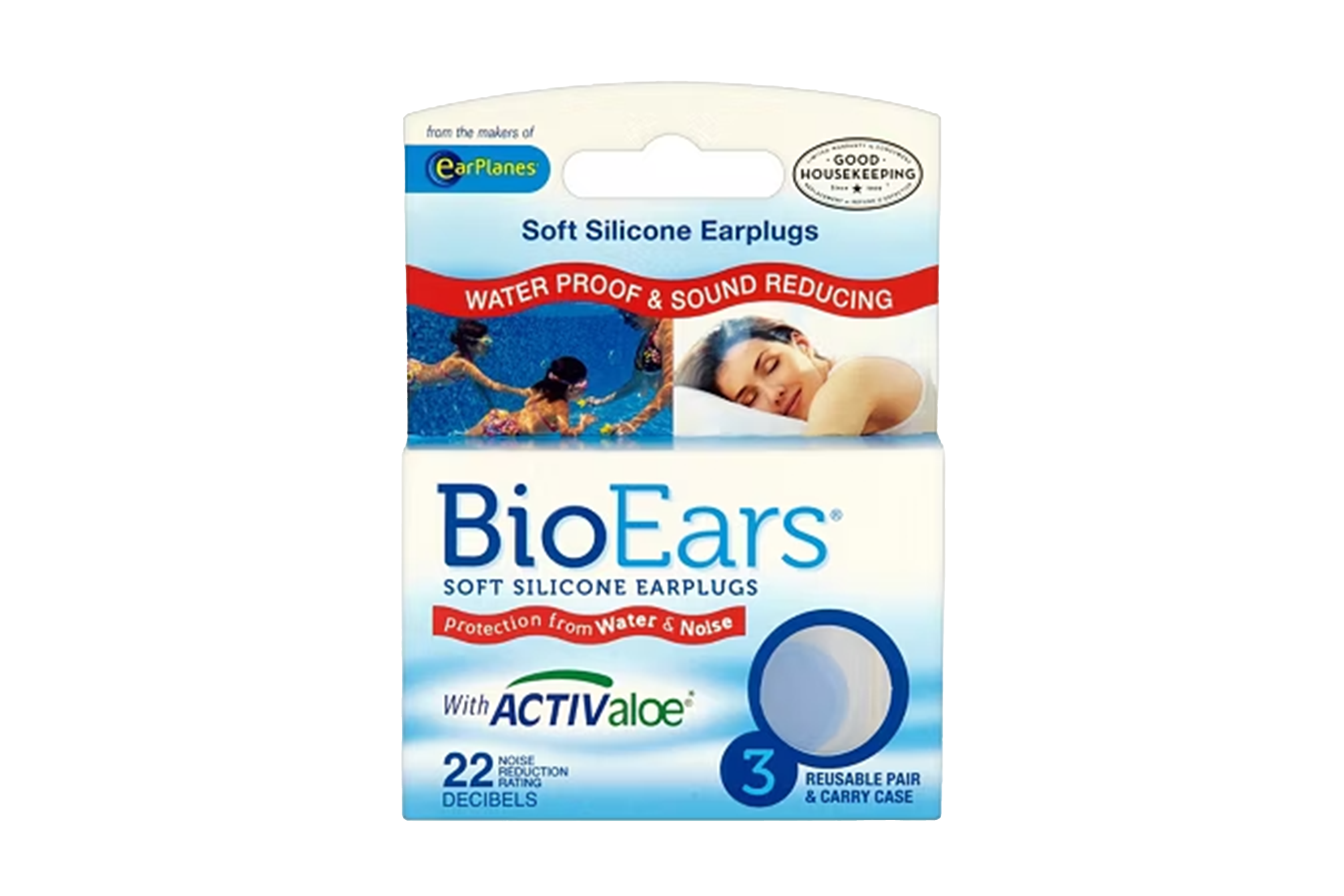
Best: Soft silicone earplugs
Material: Silicone
SNR: 23dB
Reusable: No
Why we love it
- Easy to mould
- Don’t have to insert into ear canal
Take note
- Hair can get stuck in the silicone
- High cost per use
If you don’t like the feeling of foam expanding in your ear canal while you sleep, you might want to try soft silicone earplugs. These are made of malleable silicone, so they can be rolled into a ball that sits around the ear opening to form a seal. I found them easy to shape, but I did have a few instances where my hair got stuck in the silicone, so take care to keep yours out of the way when using them.
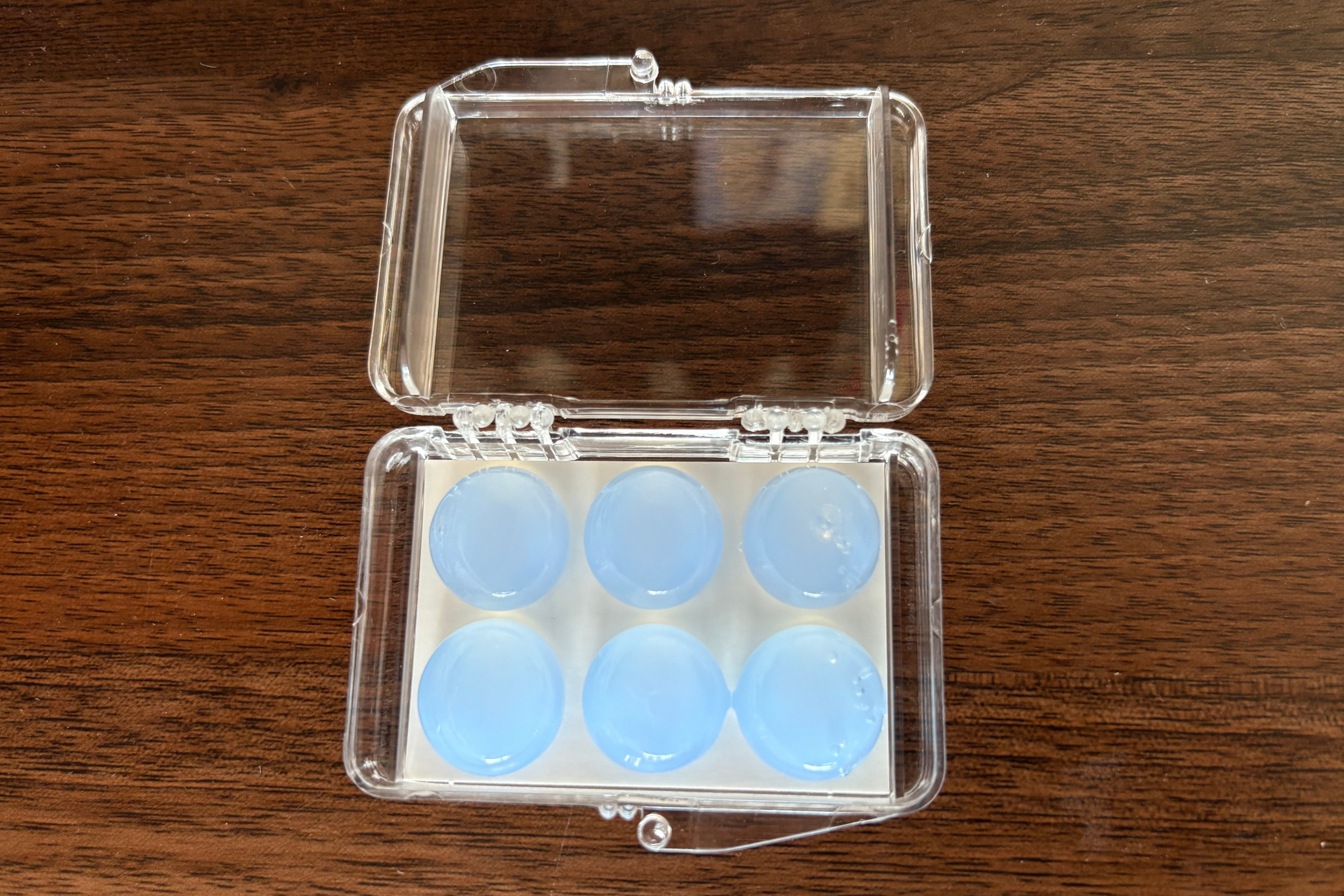
Noise reduction was decent, but it took a bit of trial and error to form a tight seal that stayed in place overnight.
Keep in mind that BioEars advises that the earplugs are single-use – with three pairs included, this works out at £1.85 for each use, so they’re a fair bit pricier than standard foam earplugs.
Buy now £5.55, Boots.com
Boots soft foam disposable earplugs
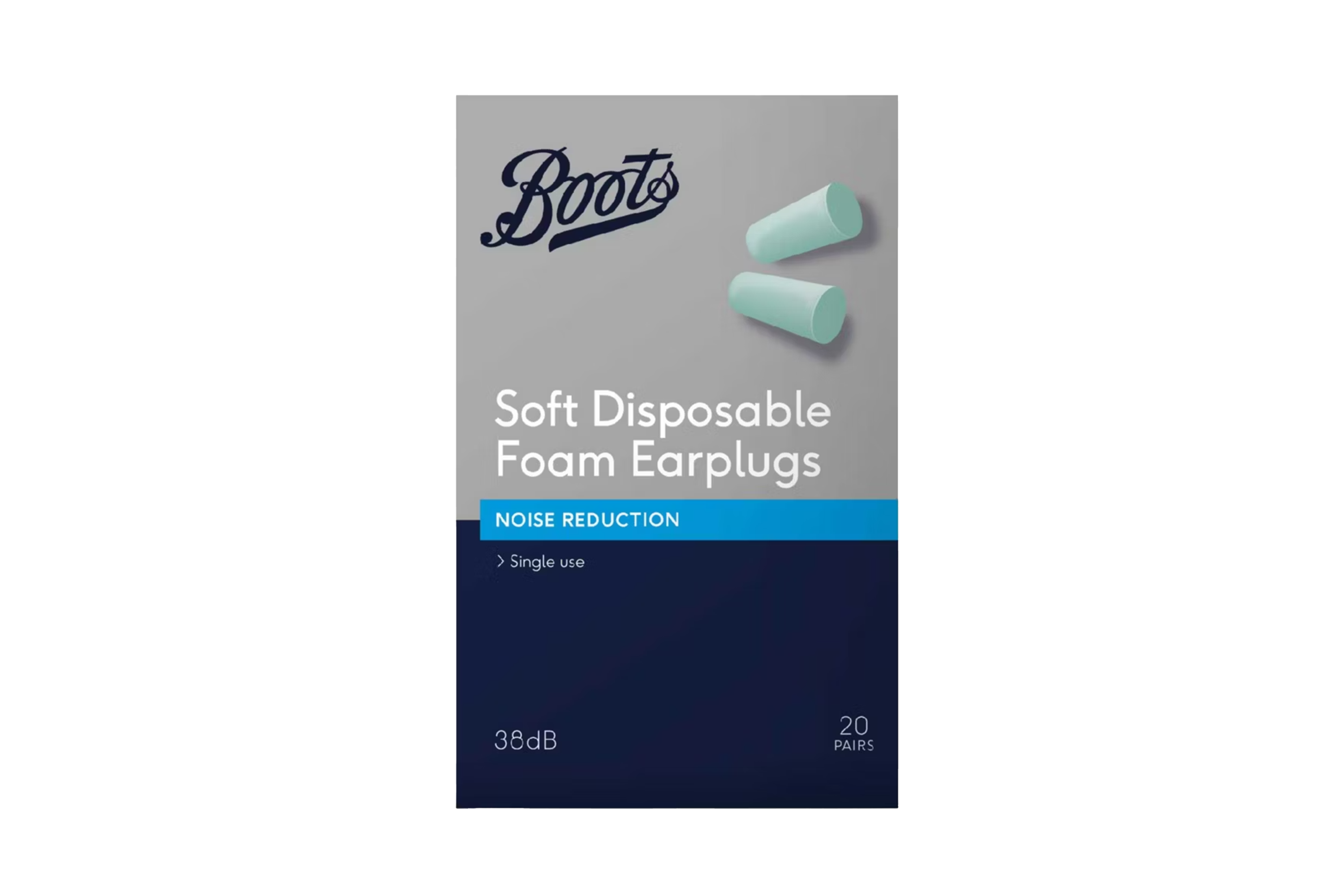
Best: For low cost-per-wear
Material: Foam
SNR: 38dB
Resuable: Dispose when earplug doesn’t return to its original shape
Why we love it
- Good value for money
- Easy to compress
Take note
- Take a while to expand in the ear canal
Most foam earplugs shouldn’t be reused after one wear, so if you want to save on a multipack, these offer the best value for money, working out at 35p per pair. Once they’ve expanded in the ear canal, Boots’s foam earplugs are effective at reducing background noise. They’re a one-size-fits-all earplug, but as with most foam designs, they can be compressed to insert into your ear, which makes it easier.
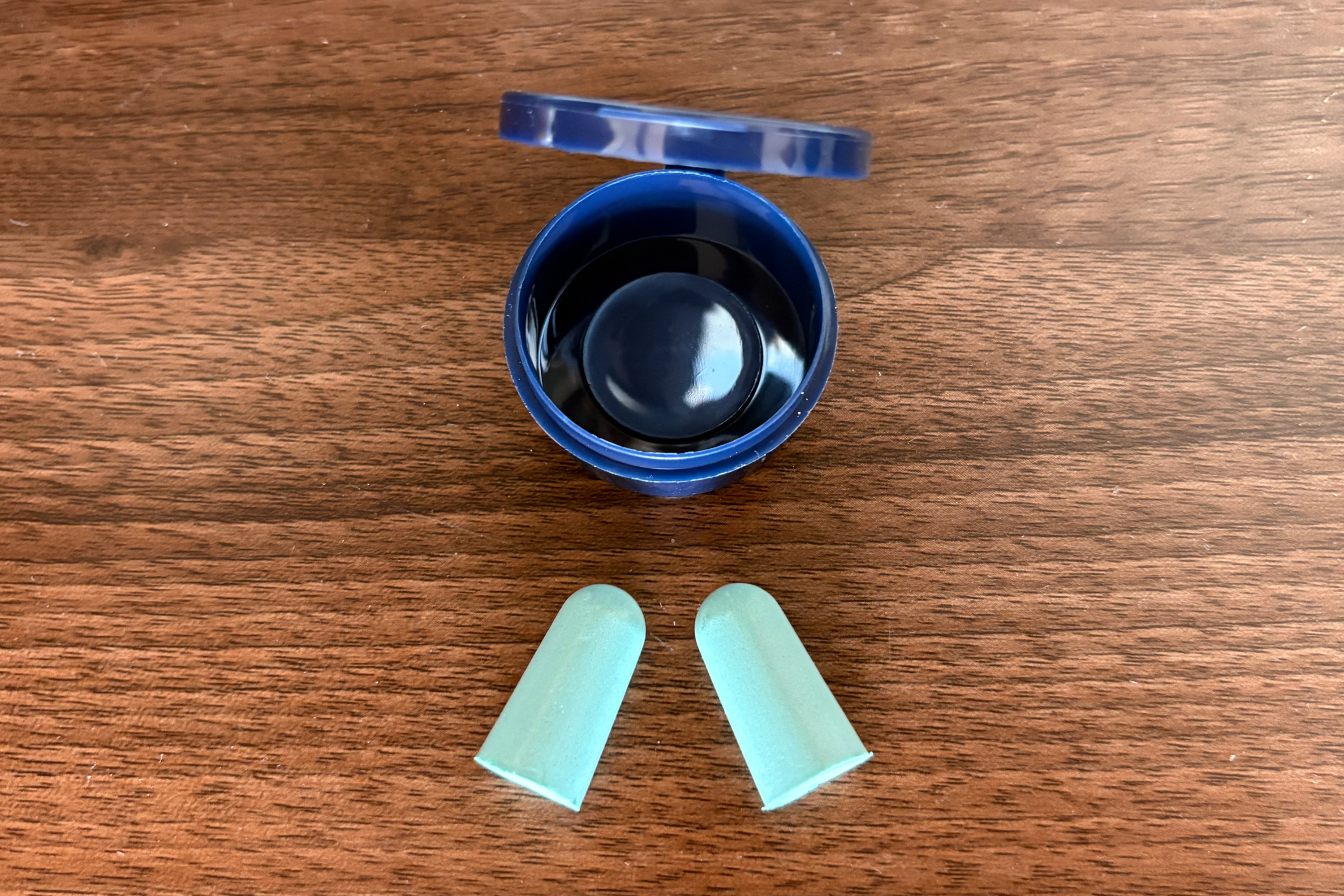
Keep in mind that disposable earplugs aren’t the most sustainable option, so if you want longevity from yours, consider the reusable options I’ve put to the test.
Buy now, Boots.com
Your questions on earplugs for sleeping answered
What are the best earplugs for sleeping?
For a pair of earplugs that are easy to insert, comfortable and effective at reducing noise, I’d recommend the Earth’s Secret mute earplugs. They’re quick and easy to put in, don’t put pressure on the ear canal and are comfortable to wear overnight, even while sleeping on your side.
If you’re a side sleeper who struggles with earplugs, you can’t go wrong with the Loop dream earplugs. They are around £10 more expensive than the best buy, but have a flat stem that sits in the ear canal, so they are super comfy to wear while lying down.
The Beary Quiet foam earplugs are worth a look, too. With quick-expanding foam that effectively reduces noise. You get 30 pairs in a pack, working out at 50p per pair, and they can be used daily for up to seven days.
What are the different types of earplugs?
Foam earplugs: These are the cheapest and softest option. As they expand inside the ear canal, they tend to be the best at blocking out noise. However, this can give a pressurised sensation. Most are single-use or require regular replacement to avoid bacteria build-up.
Silicone or wax earplugs: These soft, putty-style earplugs are moulded to form a seal around the ear opening, rather than inserted into the ear canal. They are slightly pricier than foam products but may prove more comfortable for those who don’t like the feeling of earplugs inside the ear. Some are reusable, but the sticky material can attract dirt or hair, so they shouldn’t be reused in this instance.
In-ear silicone earplugs: These are designed in a cone-like shape with ridges to fit inside your ear canal. These can feel less pressurised than foam earplugs and, although they can’t be moulded like foam, they usually come with multiple sizes in a pack.
Sleep headphones: As these aren’t single-use, they’re better for the environment, but they do come with a higher price tag. Some are noise-cancelling and can play a range of sounds, such as rain and white noise, to help you get to sleep. The IndyBest team has tested a range of the best sleep headphones, should you want more recommendations.
Is it safe to sleep with earplugs?
Yes, in most cases. Dr Siobhán Brennan advises that it’s safe to sleep with earplugs, unless an ear, nose and throat (ENT) specialist, audiologist or GP has recommended that they aren't suitable for you. They also shouldn’t be used in the following cases:
If you have any concerns, have a chat with your GP, ENT specialist or audiologist before using earplugs for sleep.
How to clean earplugs
Some earplugs for sleeping are single-use, so read the instructions to see if you can re-use them. It’s crucial to follow the instructions as bacteria build up on earplugs, which can lead to infections. When it comes to cleaning, Dr Brennan says, “For sleeping earplugs which are reusable, a damp cloth is usually suitable and ensure that they are completely dry before re-inserting in the ear.”
Looking to upgrade your sleep some more? Check out our best sleep aids from magnesium powders to quality duvets







